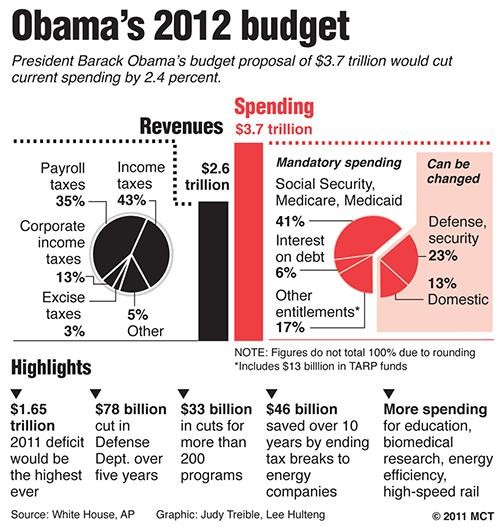WASHINGTON — President Barack Obama on Monday proposed a federal budget for fiscal 2012 that would pare back record budget deficits, but still add nearly $7 trillion to the nation’s debt over the next decade.
Obama stressed that his plan would slash the federal budget deficit by $544 billion in one year, from $1.6 trillion this year, fiscal 2011, to $1.1 trillion in the fiscal year starting Oct. 1.
He also emphasized that his budget for fiscal 2012 and the following decade would cut the red ink by $1.1 trillion from what it would total if current policies were left unchanged. He’d do it with a combination of spending cuts and tax increases.
But that falls far short of the recommendations from his own bipartisan budget deficit commission, which in November urged cutting deficits over the coming decade by $4 trillion.
Republicans won’t even wait for the next fiscal year to start before cutting spending. They plan to start cutting current year spending, with votes in the GOP-led House of Representatives this week, though final terms must be set through negotiations with the Democratic-led Senate and Obama.
“”He’s going to present a budget … that will continue to destroy jobs by spending too much, borrowing too much and taxing too much,”” House Speaker John Boehner, R-Ohio, said Sunday on NBC’s “”Meet the Press.””
“”It looks to me that it is going to be very small on spending discipline and a lot of new spending on so-called investments,”” said House Budget Committee Chairman Paul Ryan, R-Wis. “”Borrowing and spending is not the way to prosperity. Today’s deficits mean tomorrow’s tax increases, and that costs jobs,”” Ryan said on “”Fox News Sunday.””
Obama aides said the budget would set up a clash of ideas with the Republican-controlled House over how best to rein in the government’s soaring deficits and skyrocketing national debt.
Obama proposed that the government spend $3.7 trillion next year, down $100 billion from this year’s $3.8 trillion.
One factor that would keep spending in check: a freeze on the domestic part of the budget that doesn’t include Medicare, Medicaid and Social Security or security spending such as the FBI.
Also, defense spending would drop 5 percent next year as troops are withdrawn from Afghanistan and Iraq.
As spending would stay roughly the same, tax collections would jump by $453 billion, or 21 percent, helping to slash the deficit.
One big factor in the increased tax collections: an increase in the Social Security tax paid by all American workers regardless of income, starting next January. Obama and the Congress in December agreed to lower the tax for a year to help spark the economy. Obama proposes to let the wage tax return to its usual level after Dec. 31.
Longer term, Obama’s blueprint would keep government spending flat in fiscal 2013 as well. One key reduction: Pentagon spending would drop by $78 billion over five years, much of it from weapon programs such as a Marine landing craft and a new engine for the Joint Strike Fighter.
Overall, though, Obama proposes to let federal spending start rising again every year starting in fiscal 2014, from a minimum of $201 billion a year to a maximum of $278 billion.
Obama also proposed raising select taxes beyond the Medicare and Social Security payroll tax that would increase next Jan. 1.
He asked Congress to limit deductions for the wealthy, and proposed higher taxes on oil and gas producers totaling $46 billion over 10 years.
Taxes and other government revenues would never match spending, though. The annual deficit would drop to a low of $607 billion in fiscal 2015, then start rising again. It would reach $774 billion in fiscal 2021.
Government debt held by the public would rise by $6.7 trillion, from $10.9 trillion this year to $17.6 trillion in fiscal 2021, according to White House figures.
Obama largely ignored the recommendations of the bipartisan budget commission, which in November urged more than $4 trillion in cuts to projected deficits over the next decade. He didn’t propose any changes in the biggest domestic spending programs — entitlements including Social Security, Medicare and Medicaid — which the commission said must be revised if the debt is ever to be tamed.
He faces a Republican House determined not only to cut more, but also to start immediately.
House Republicans propose to cut $61 billion from the current year — which would be $100 billion lower than the budget that Obama proposed last year for fiscal 2011, which began Oct. 1.
The Democratic Congress last year didn’t pass a budget or the bills needed to finance the government for the fiscal year that started Oct. 1. Instead, they passed a stop-gap measure that finances the government at fiscal 2010 levels.
That lasts only until March 4, when another funding measure must be passed or the government may shut down, much as it did twice in 1995 when the Republican-led Congress was initially unable to come to terms with Democratic President Bill Clinton.









